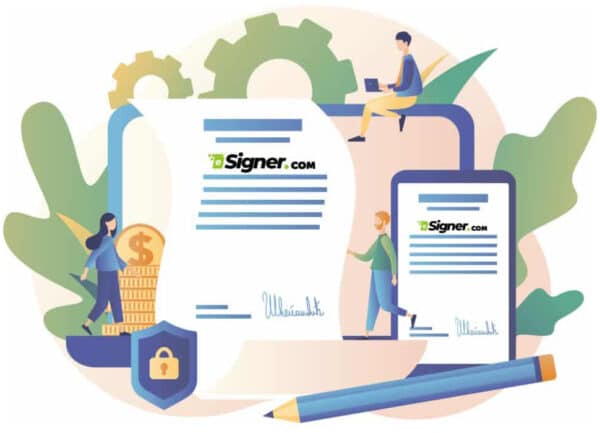SSL.com’s eSigner cloud document signing service provides simplified remote access to Adobe-trusted and MS Doc-capable digital signatures via a convenient web application and API. Find out more about digital signatures, the various document signing solutions offered by SSL.com, and how to get started signing documents with eSigner.
What Are Digital Signatures?
With so much business happening on the internet, it’s no wonder that the popular PDF file format is now a global standard for documents like invoices, purchase orders, and contracts. But how do you know that a PDF you receive from a vendor, business associate, or colleague is authentic? Or that the PDFs you send are safe from tampering while in transit?
Document signing certificates from publicly trusted certificate authorities like SSL.com can be used to create digital signatures that are trusted worldwide. The process works like this:
- A person or other entity (such as a business or organization) requests a document signing certificate from a certificate authority (CA), like SSL.com.
- The CA validates the identity of the applicant and issues a signed certificate.
- The owner of the certificate can use it, along with their private signing key, to digitally sign electronic documents like PDFs.
- Software like Adobe Acrobat can use the digital signature to verify the authenticity and integrity of the signed document, meaning that:
- The identity of the signatory has been validated by a trusted CA (authenticity).
- The content of the document has not been altered since it was signed (integrity).
- Because the authenticity and integrity of a digitally signed document is assured, digital signatures provide legal non-repudiation—a signatory cannot plausibly deny that they signed a document.
Legal and Enforceable
Certificate-based digital signatures are accepted and legally enforceable worldwide. Because they ensure the authenticity and integrity of digital documents, many jurisdictions—including the European Union’s eIDAS regulation—give additional legal weight to digital signatures over and above simpler types of electronic signatures, such as images of ink signatures. (For much more information on the legal status of digital signatures worldwide, please read Digital Document Signing Laws: A Global View.)
Trusted by Adobe Acrobat
Not all document signing certificates are equal. Only CAs that are part of the Adobe Approved Trust List (AATL)—like SSL.com—can provide digital signatures that are automatically trusted by Adobe software, including Acrobat and Acrobat Reader.
Document Signing Solutions from SSL.com
For compliance and security, private signing keys for Adobe-trusted document signing certificates must be generated and stored in FIPS 140-2 Level 2/Common Criteria-certified devices and must not be exportable. SSL.com offers a range of compliant solutions, including USB tokens, support for third-party HSMs (hardware security modules), and our eSigner cloud signing service.
USB Token
Document signing certificates are often provided on small USB hardware tokens. SSL.com offers its Business Identity document signing certificates on FIPS 140-2 validated security key USB tokens.
Pros:
- Convenient for individual users.
- Can be used to sign documents on multiple computers.
- Usable offline.
- May provide additional token features like single sign-on (SSO).
Cons:
- Inconvenient for large organizations or departmental/role-based signing.
- Token with private signing key may become lost or damaged.
- Driver issues may limit compatibility and/or ease of use on some platforms.
Hardware Security Module (HSM)
Organizations can also install document signing certificates on their own compliant networked hardware security module (HSM) or a cloud HSM service. SSL.com currently supports customer installation of document signing certificates on a range of HSMs.
Pros:
- Convenient for organizations managing multiple document signing certificates and/or departmental/role-based signing workflows.
- Private keys not as exposed to loss or damage as with tokens.
Cons:
- CA will require evidence supporting compliant key generation and storage, possibly resulting in extra expense.
- Additional expense of HSM hardware or cloud service.
- Technical expertise required for installation, networking, and implementation of document signing apps and APIs.
Document Signing as a Service: eSigner from SSL.com
Pros:
- Convenient for individual signers and team-based workflows.
- Signatures are available from any internet-connected workstation or device. Provides an option to generate certified signatures which provide a higher level of document control than regular digital signatures.
- PKI is handled by SSL.com: no extra hardware and staffing expenses.
- Keys are stored securely and compliantly in SSL.com’s HSMs.
- Intuitive eSigner Express web application.
- Cloud Signature Consortium (CSC) API for integration with front-end apps like Adobe Sign.
- DocSignTool command-line utility for use with scripts and automation processes.
Cons:
- Cannot be used offline. However, eSigner customers may also order one or more YubiKey tokens with their certificate if offline use is necessary.
eSigner Apps and APIs
eSigner Express
SSL.com’s eSigner Express GUI web application lets you and your teammates easily create digital signatures on the web, with no need for hardware tokens. Please read Sign Documents in the Cloud with eSigner Express for more information on how it works.
CSC API, Document Signing API, and DocSignTool
Businesses and software developers can use SSL.com’s Cloud Signature Consortium (CSC)-compliant API, document signing API, and DocSignTool command-line tool to leverage the eSigner service for use in their own applications and scripts.
Get Started with eSigner
Check out these links for much more information about getting started with eSigner, or submit the form below to contact a member of our enterprise sales team.
- Main eSigner Page with Pricing Information
- Enroll with eSigner for Remote Document and EV Code Signing
- Sign Documents in the Cloud with eSigner Express
- eSigner DocSignTool Command Guide
- Remote Document Signing with eSigner CSC API
- Team Sharing for eSigner Document and EV Code Signing Certificates
- Integration Guide to Testing Remote Signing with eSigner CSC API
eSigner Information Request Form
